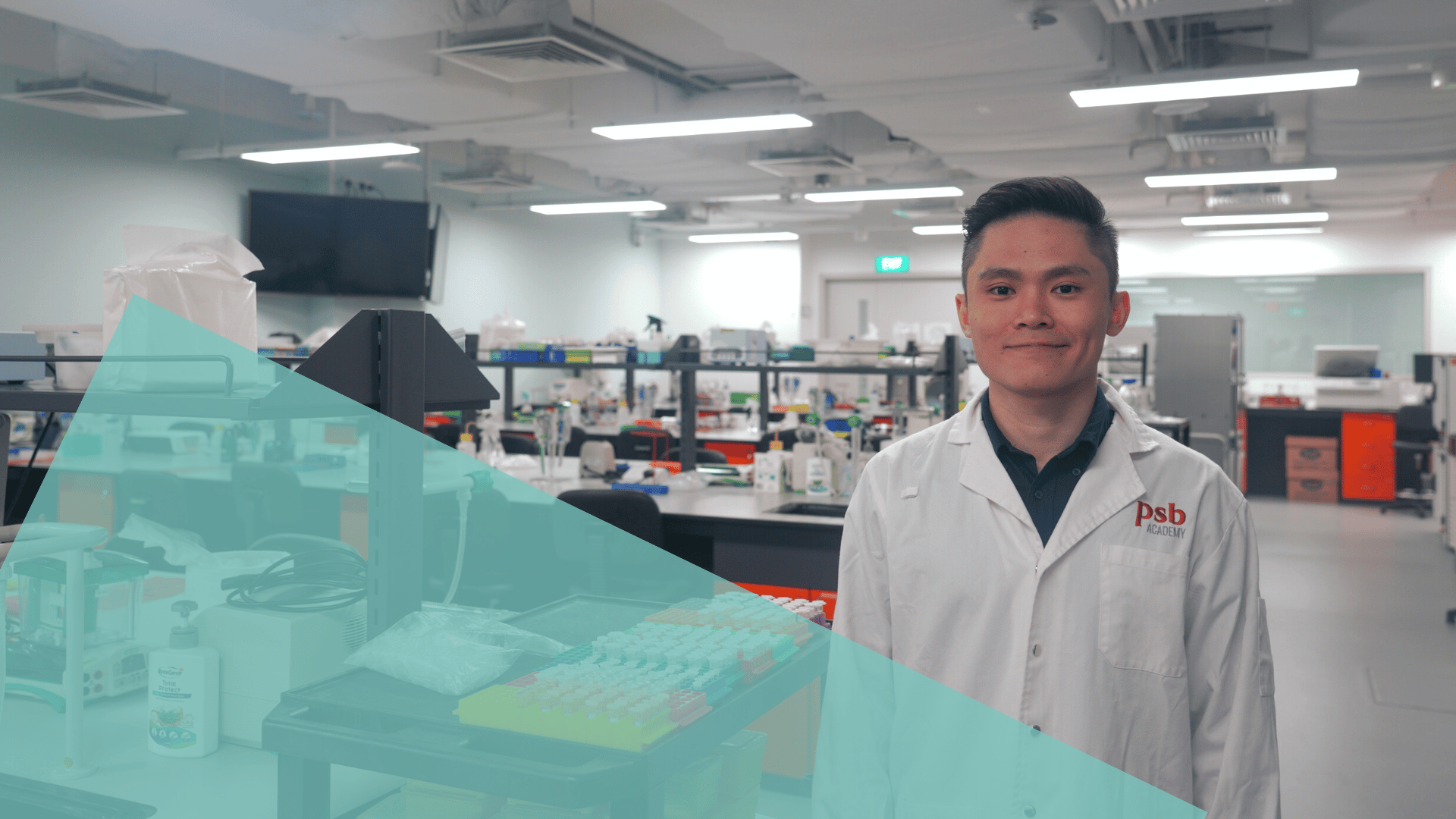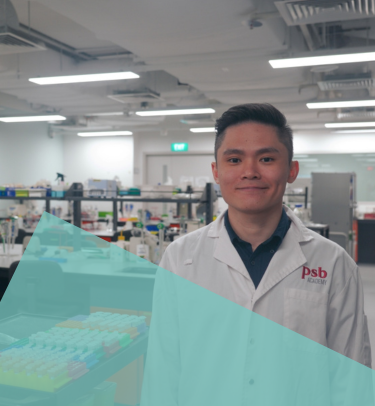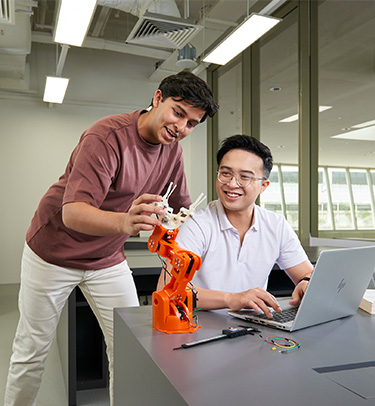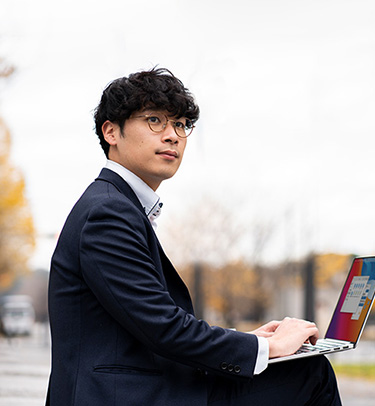Although his background was in aeronautical engineering, Nick Tan developed an interest in the human anatomy, and subsequently, biomedical science, when he was training as a dragon boater for Singapore’s national team. After participating in the 2019 Southeast Asia (SEA) Games, he decided to pursue his interest by enrolling in a Bachelor of Biomedical Science degree programme by La Trobe University with PSB Academy.
Today, as a medical technologist at the National University Hospital, Nick specialises in conducting infectious diseases and oncology tests as part of his daily responsibilities. Despite his busy schedule, PSB Academy had the chance to catch up with Nick recently and ask him about his remarkable journey.
Hi Nick, could you briefly share with us how you became a medical technologist?
Previously, I was working full-time at ST Engineering Aerospace and also training as an athlete for the national dragon boat team. Then I became interested in how the human body works when I was looking for ways to improve my own performance. I also wanted to find out what was compromising my results.
A teammate recommended that I develop my interest in life sciences at PSB Academy. After some research, I decided to pursue a Bachelor’s degree in Biomedical Science after the 2019 SEA Games. In retrospect, I'm glad that I did!
How did you know about PSB Academy? What made you decide to enrol with us instead of other institutions?
I considered many institutions during my search to further my studies and finally decided on PSB Academy. It appeared to be the most welcoming option for a 29-year-old back then to start studying again after several years. From its approachable lecturers to its easy-to-understand curriculum, it just seemed like a good fit.
How do you find PSB Academy and La Trobe University’s curriculum?
I first enrolled in PSB Academy’s Foundation Diploma in Life Sciences, which was a smooth and accessible programme for students like me who didn't have a strong understanding in sciences. It allowed us to grasp scientific concepts at an accelerated rate. Later on, I chose La Trobe University’s degree programme because of its precise learning materials and manageable modules, which enabled me to understand concepts as a whole before delving into the nitty gritty information, from cell senescence to pharmacodynamics and pharmacokinetics!
How did you cope with the challenges of learning in school while handling work, family and other commitments?
Time management is key. I usually started doing assignments and projects ahead of time and also clarified any doubts early. Taking frequent, short breaks is important, as once you lose focus, you are just wasting time, which could be better spent on resting.
Also, being able to multi-task well in any working environment will benefit oneself. As you familiarise yourself with work procedures, it will only get easier.
You are now a medical technologist at the National University Hospital (NUH). Can you tell us more about what you do?
At the Molecular Diagnosis Centre of the NUH, I mainly run both infectious diseases and oncology tests, such as Hepatitis E Virus PCR tests and MGMT Promoter Methylation tests. How soon a patient is warded or discharged or what type of treatment a clinician would administer is determined by our test results. This puts pressure on me to conduct the tests properly, but it also gives me a sense of purpose in the work I do.
Were there any technical skills or knowledge that have helped you perform better in your current working environment?
As a medical technologist, I am expected to adhere to the principle of “First, Do No Harm,” just like the clinicians and nurses. This means that any mistakes, whether they directly or indirectly affect a patient’s well-being, are unacceptable.
My modules, such as the Advanced Biochemistry and Medical Biology Laboratory, taught us the importance of being meticulous in our calculations and analysis of results. This has become a habit for me - I always make sure to thoroughly check and double-check all reports before releasing them to clinicians.
How did your course enable you to have an edge over others career-wise?
My course has given me the know-how to interpret medical laboratory results. For example, I know whether a particular qualitative result should be followed up with further quantitative tests, or whether a peculiar report should be highlighted to a clinician.
One La Trobe University module that has helped me tremendously in interpreting laboratory results is the Applications in Biomedical Science, where you take clues from complete blood count and patient experiences and diagnose the possible problems that a patient might be going through.
Lastly, the experience that I gained from my internship as a laboratory assistant at PSB Academy gave me the confidence and practice to perform well in a clinical laboratory. I was able to dilute DNA concentrations on the fly and plan a proper workflow to facilitate efficient multi-tasking.
What did you like most about the degree programme?
The lecturers, of course! They were engaging and inspired me to become a better medical technologist. In particular, Dr Agnes Lim taught us that the key to understanding concepts is to draw connections between them. Dr Renugah Naidu always emphasised the importance of questioning and understanding the purpose behind every step in a process, and Dr Seah Seng Wee always simplified complicated topics for us and was very encouraging.
Do you know of any stigmas about studying at private education institutions?
To say no would be a lie. However, being a private education student has got a major advantage, and that is time. We have more time to gain experience in our field of study, be it in the form of internship or a part-time laboratory job, which would give one the advantage needed to secure a career they are passionate in, as it did for me.
Do you think studying a degree in a private education institution in Singapore has put you at a disadvantage when looking for a job?
No, most employers would look at other factors, such as your work ethics and experience, instead of just where you got your degree. It is even an advantage when it comes to character development because you are left to manage your time while you juggle other commitments. Finding a balance between work, study and other commitments requires discipline. You also get an opportunity to study with students of all backgrounds and ages, which further develops your presentation and interpersonal skills.
Do you have any advice for Singaporeans who want to embark on a similar journey as you?
Let your passion drive you, even if it is the opposite of what you are doing, because if you have the desire to learn more about a particular field of study, you will only do well. Even if you find it difficult to cope, there is no stigma if you take fewer modules or a longer time to get your certification. Any progress, however small, is still progress. Most importantly, you need to take that first step.
Any aspirations for the future in terms of your career? How do you think PSB Academy will be able to help you achieve them?
I plan to study for a Master’s degree in Molecular Biology on a part-time basis in the future, but for now, having a stable career takes priority. If PSB Academy offers the course, why not?




 TOP
TOP



_2.png)

